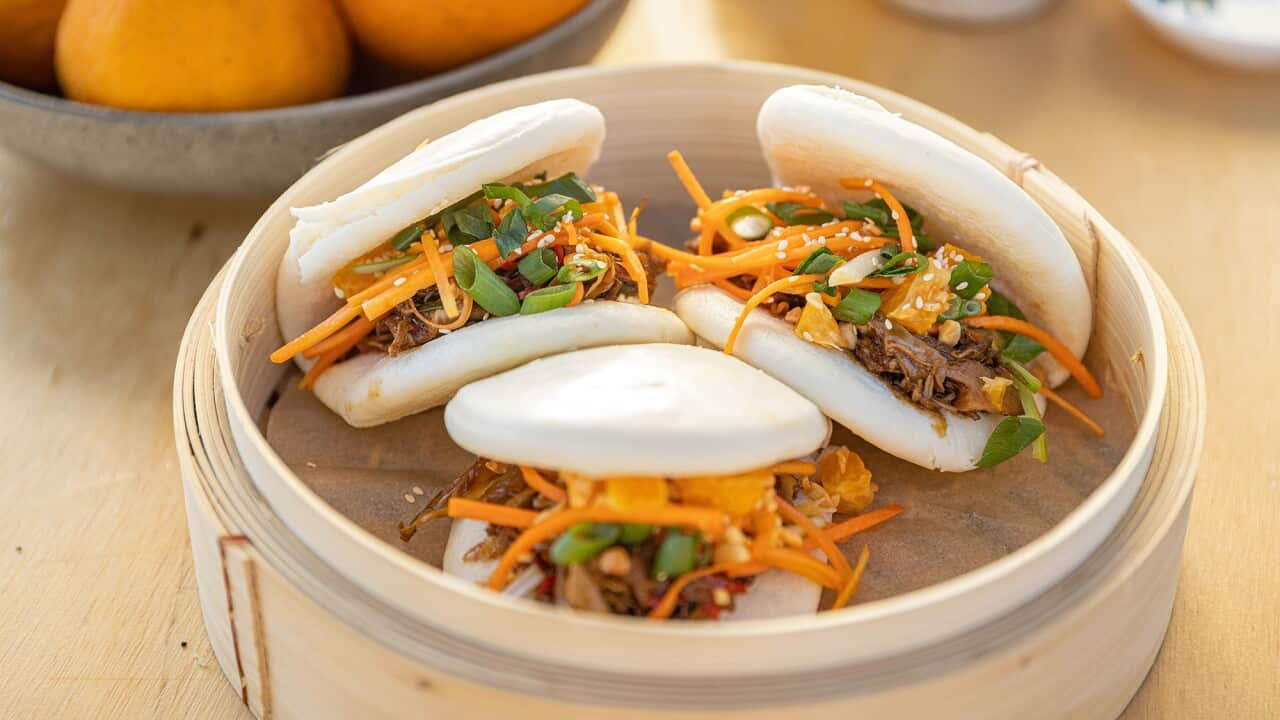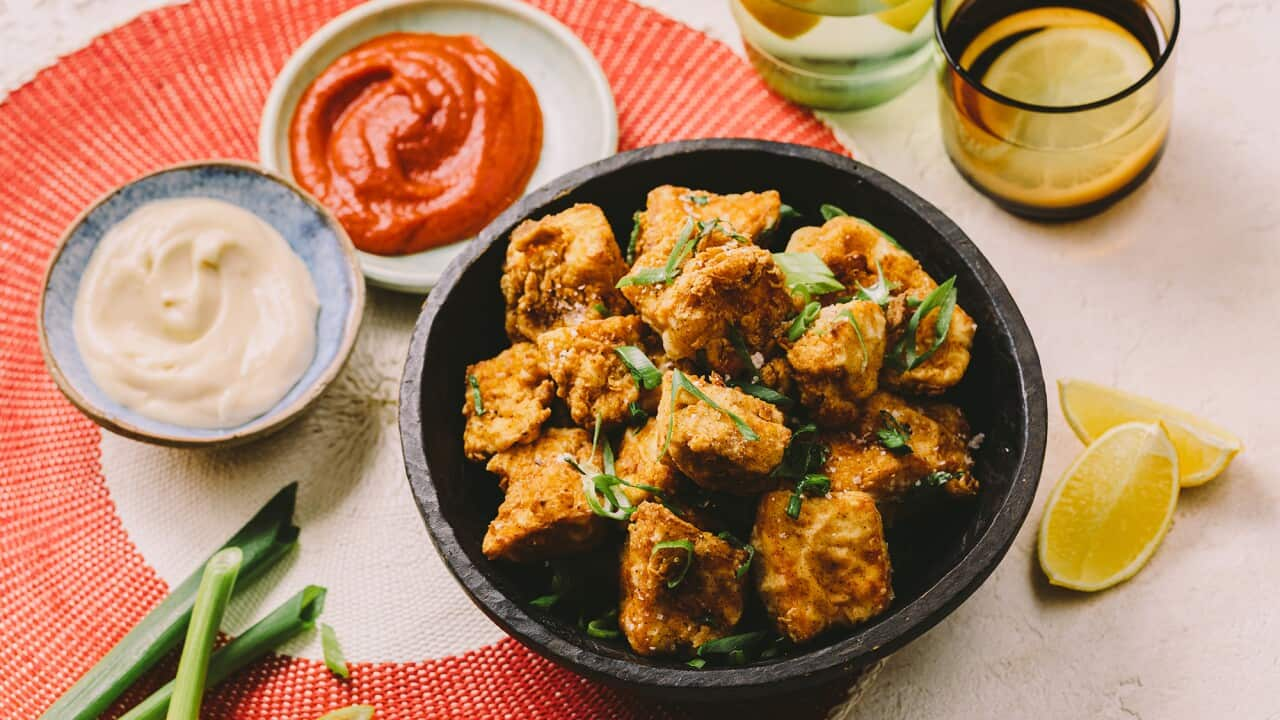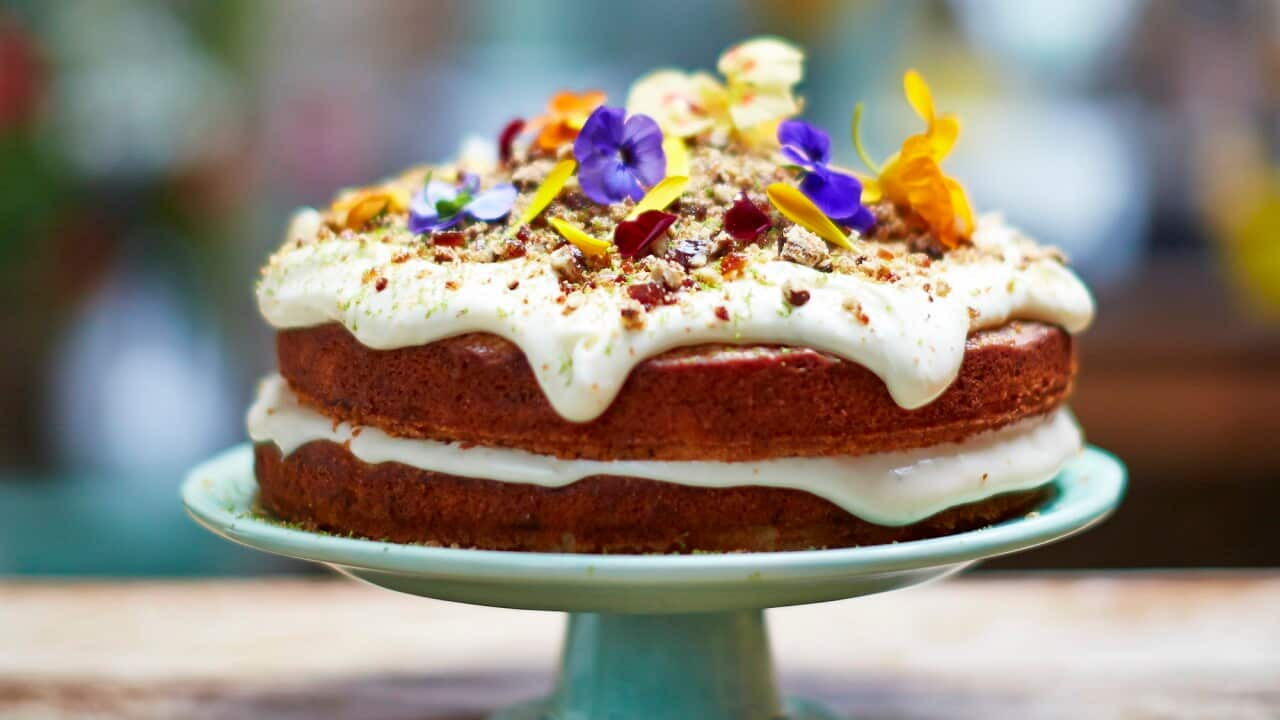serves
4
prep
30 minutes
cook
2:30 hours
difficulty
Ace
serves
4
people
preparation
30
minutes
cooking
2:30
hours
difficulty
Ace
level
Ingredients
Pork bone broth
- 1 kg Pork neck bones
- 1 brown onion
- 1 knob ginger (20 g), roughly crushed
- 2 tbsp neutral cooking oil
- 1 tbsp sea salt
- 3.5 litres water
- 25 g dried shrimp
- 1 bunch coriander stalks
- 1 ½ tsp anchovy salt (I like Red Boat)
- 30 g rock sugar or 1 tbsp sugar
- 40 ml quality fish sauce (I like Son)
Pork blood Jelly
- 1 box pork blood jelly
- ½ tbsp sea salt
- 1 knob ginger (20 g), roughly crushed
- 2-3 litres water
Annatto oil
- 10 g annatto seeds
- 30 ml neutral cooking oil
Bánh canh (noodles)
- 250 g rice flour
- 150 g tapioca starch
- 1 tbsp cooking oil
- ½ tsp salt
- 400 ml hot water
Mud crab
- 1 (800 g-1.3 kg) live mud crab (top shell removed and main body quartered)
- ½ bunch spring onions, cut in 5cm batons
- 3 Thai shallots, finely diced
- 3 garlic cloves, finely diced
- ½ tsp sugar
- ½ tsp cracked white pepper
- ½ tsp anchovy salt (optional)
- 1 tbsp premium fish sauce
- 2 tbsp annatto oil
- 1 can (425 g) whole straw mushrooms, halved
- 1 can (454 g) quail eggs
- 3 tbsp (50 g) potato starch
- 6 tbsp water
Garnish
- ½ bunch spring onions, finely sliced
- 1 bunch coriander, roughly hopped
- 1 bunch saw tooth coriander, finely sliced
- 4 teaspoons dried shallots
- cracked white pepper
Instructions
- For the pork bone broth, wash bones under cold water, then place on a roasting tray lined with baking paper along with the brown onion and ginger. Drizzle with oil, sprinkle over ½ tablespoon sea salt, then roast in a pre-heated oven at 220°C for 20 mins.
- In a large stock pot add 4 litres water, ½ tablespoon salt and the remaining pork bone broth ingredients. Bring to the boil, then add roasted pork bones, onion and ginger. Simmer for 90 to 120 minutes or until pork bone meat is tender, occasionally skimming off impurities that float to the top.
- Remove and reserve bones then strain and set broth aside. Optional: Collect the cooked dried shrimp and add to strained broth.
- Duncan's tip: Enjoy the pork bones as an entrée or snack with a dipping sauce made with 15 ml fish sauce, freshly sliced chillies and a gentle squeeze of lime.
- For the pork blood jelly, cut pork blood jelly in quarters.
- Place in large pot, cover well with water, add ½ tablespoon of salt and a knob of ginger (20 g). Bring close to the boil on medium and occasionally stir (about 30 mins).
- Once almost boiling, reduce heat to very low for 20 minutes, occasionally skimming off impurities. Cover and remove from heat to allow residual heat to cook pork blood jelly through for 20 minutes.
- Remove and place in a water bath for 15 minutes, then slice into large bite sized pieces.
- For the annatto oil, in a small fry pan add oil and the annatto seeds, warm on medium heat until it bubbles.
- Remove from heat and allow annatto seeds to steep in the oil for a further 2-3 minutes then strain and set the oil aside.
- For the noodles, in a stand mixer add rice flour, tapioca starch, salt and cooking oil and mix until well combined. Alternatively mix in a large bowl using chopsticks.
- Mix on medium and add 50 ml of very hot (just boiled) water at time until well combined. Remove from mixing bowl and with a dash of oil and knead until smooth. Allow dough to rest and set aside until broth is ready.
- For the mud crab, and to serve, place mud crab in the freezer for 1 hour to put it to sleep, then under running water brush well (toothbrush works well) to remove excess dirt.
- With your hands, break off claws and legs. Remove top shell and gills by cutting between crab’s main body and top shell with scissors. Cut main body in half, or for large crab in quarters. With the back of a knife, hit claws to create fractures in the shell. In a small bowl, scrape and collect any roe and tomalley in the top shell and main body.
- Place large stock/casserole pot on medium heat then add oil, reserved crab roe, spring onion batons, garlic and Thai shallots and sauté until lightly golden and fragrant.
- Add sugar, white pepper, anchovy salt, fish sauce, 2 tablespoons annatto oil and mud crab and stir well then saute for 2-3 mins.
- Add straw mushrooms and two ladles of pork bone broth and bring to the boil then cover and simmer on low-medium for 5 mins or until mud crab just cooked through.
- Remove mud crab and allow to cool before picking meat out of the legs and main body (leave claws intact). Alternatively, serve mud crab pieces as is with shell still on (preferred)
- Add remaining pork bone broth, quail eggs and annatto oil to the pot and bring to the boil then simmer then it’s time to add the bánh canh noodles.
- Split up bánh canh dough into four equal parts. Pat hands with cooking oil and shape dough into a ball. With a rolling pin, roll one ball at a time out into a rectangle about 2-3mm in thickness then slice into 3-4mm noodles, being careful not to let them stick together, and place immediately into the pot one strand at a time and repeat for remaining dough. Don't worry if they are a little rustic.
- Once all noodles are in the pot, bring to the boil and reduce back to a simmer and cook for another 3-5 minutes.
- In a small bowl add potato starch and water and mix well to create a loose slurry. To thicken the soup to a gravy consistency, bring to the boil and add 3 tablespoons of potato starch slurry first and immediately stir in well for 1 min. If desired thickness is not achieved add more potato starch slurry as required (see note).
- Finally, add pork blood jelly pieces, mud crab meat and claws and warm through.
- Ladle bánh canh cua and mud crab pieces into serving bowls and garnish with spring onions, coriander, saw tooth coriander, dried shallots, and white pepper. Serve with chopsticks and a large soup spoon.
Notes
•Potato starch slurry can settle, mix well before adding. If too much potato starch is added and soup is too thick, add water/chicken broth to loosen and re-season with fish sauce.
Cook's Notes
Oven temperatures are for conventional; if using fan-forced (convection), reduce the temperature by 20˚C. | We use Australian tablespoons and cups: 1 teaspoon equals 5 ml; 1 tablespoon equals 20 ml; 1 cup equals 250 ml. | All herbs are fresh (unless specified) and cups are lightly packed. | All vegetables are medium size and peeled, unless specified. | All eggs are 55-60 g, unless specified.









